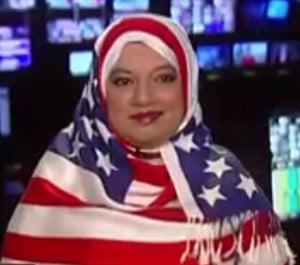MMW is excited to welcome wood turtle as our newest contributor! You may know her already from previous guest posts or from her personal blog, and we look forward to having her as a regular part of the MMW team.
Earlier this month, the Canadian province of Quebec elected its first female Premier. Headed by Pauline Marois, the Parti Québécois won a minority government after almost 10 years of Liberal rule. This election was also marked by accusations of xenophobia and racism, and ended dramatically with arson and a fatal shooting during Marois’ victory celebration speech.
And unsurprisingly, there was a hijab controversy to top it all off.
Based on the intricacies of identity politics, and aiming to safeguard Québécois culture and the French language in Quebec, the Parti Québécois (PQ) platform included stricter language laws and a new Charter of Secularism banning religious symbols for public servants. Naturally, what better symbols of religion are there than the kippah or the turban? Certainly not the giant cross that hangs in the legislature, Christmas trees or discreetly worn crucifix necklaces — because under the charter of secularism, these symbols would get to stay.
A common thread during this election was defining the new secularism charter with the ultimate religious symbol: the hijab. At least, that’s how religious or cultural clothing is postured when Muslims are used as a political tool. Even though there were other important issues such as the tumultuous student strike and tuition increases, the controversial Law 78 that limited fundamental civil liberties, and decreased access to social services with higher daycare fees, it wasn’t long before English-based coverage of the election focused on the immense “hijab backlash,” screaming that under a PQ government the “crucifix stays, but hijabs go.”

At the moment, the secularism charter is a vague outline. Nothing has been drafted into legislation and PQ officials have been unclear as to what would be banned outright. At first it was all religious symbols (except those which are a part of Quebec’s culture and heritage, namely, Roman Catholic). Then the Montreal Gazette published suggestions that “pretty scarves women sometimes wear” would be acceptable along with kippahs, since they’re not that “ostentatious” — but officials quickly back-pedaled on the Jewish skullcap, adding it and turbans to the banned list.
Despite this, some of the English media I’ve come across styled the issue only as an outright ban against hijab. One article refers to the secularism debate as a “hijab controversy,” but doesn’t actually refer to hijab or Muslim women in the article itself, but instead talks about the cross that hangs in the legislature for the entire piece. Another goes to great lengths just to find one hijabi who voted PQ despite the threat to her religious rights. While not every news source focused on the charter of secularism in terms of a hijab ban, it is problematic to frame the charter of secularism only as a Muslim problem. The charter is discriminatory, goes against the tenants of multiculturalism, and is based on an agenda of forced assimilation on all religious minorities. You can’t possibly sum that up by turning hijab into a controversial symbol and throwing it into a headline.
As far as the media coverage of the secularism charter goes, things could have been worse. Recently in Ontario’s tabloid press, a male news anchor dressed up in niqaab to mock the new Egyptian women television network and a columnist published his outrage that a woman in niqab was the public “face” for a government institution. While not as overt, the hijab election coverage deliberately embroiled Muslim women in the nationalist debate — if not in substance and reality (yet), then in crappy headlines alone. Though, this too is part a broader issue within Quebec society, where some fear that “Quebec values” are being eroded by religious minorities and proof that once again, culture wars are being fought on the bodies of women.
There was no mistake in the PQ choosing Djemila Benhabib, to be one of their “star candidates” as one news source calls her, although Benhabib ultimately lost in her riding. Of Algerian origin, Benhabib has been a staunch opponent of the hijab, referring to it as a “shroud of death” and warning against confusing “religious accommodations” with support for “Islamist ideals” on her website. During the campaign, she touted the party line that the secularism charter will safeguard Quebec values and is needed to affirm equality between the sexes. But as it’s been argued elsewhere on MMW, “secularism does not necessarily mean gender equality.”
Now, there is no doubt in my mind that the PQ’s version of secularism is a threat to minority rights and echoes the anti-Muslim rhetoric sweeping Europe. Just a few years ago, the Liberal government in Quebec proposed Bill 94, which would ban the niqab for women delivering and receiving public services — and now it just might be everyone without a “pretty scarf.”
So as a civil servant who wears hijab, I have to ask, if I lived in Quebec, would I be able to wear my leopard print scarf to work or not?
In the near future it will be interesting to see how much effort Marois and her party will put into wording the official secularism charter without coming across as xenophobic, without infringing on people’s fundamental rights, without placing the burden of religion on Muslim women, and without alienating francophone Muslims who are quite happy identifying as Québécois.
In her victory speech, Marois referred to being the first woman premier of Quebec, “I say to all women tonight I will try to honour us all.” But upholding the ideals of the secular state also means upholding the rights of every individual. So as this story continues to unfold, it will be interesting to see if Marois will indeed honour ALL women.











